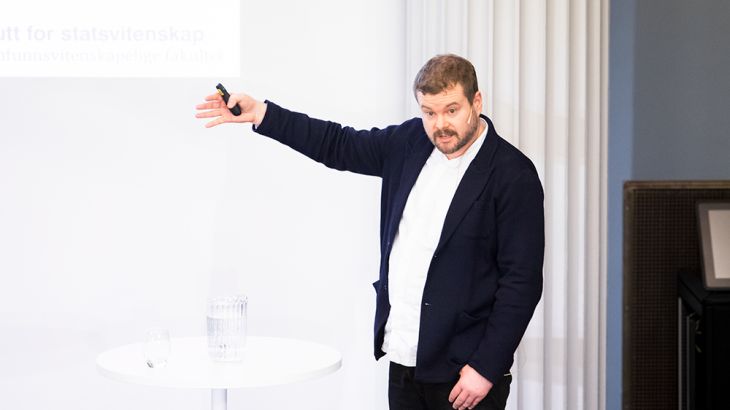"It is very significant for me to receive an award in Fridtjof Nansen's name, especially in these times with brutal wars in Ukraine and Gaza, and serious threats to democracy internationally", says Professor Tore Wig from the Department of Political Science. He receives this year's Fridtjof Nansen Award for Younger Researchers in the category of Humanities and Social Sciences.
Tore Wig enjoys both researching and disseminating : In my experience, you get a lot in return for disseminating, both academically, because it generates exciting debates that you often learn from, and it also gives status and recognition.
This article is translated by UiO:GPT Version 4
"Wig has distinguished himself as a researcher at the international research front, and nationally as an active communicator and debater," is stated among other things in the explanation of the award.
"Nansen played an important role as a peace worker, humanitarian and scientist in his day. Today, he is particularly relevant. Research on war, peace, and democracy has perhaps never been more important", states Tore Wig.
In the committee's recommendation, it is stated among other things: "Through his research, Wig attempts to understand the causes of civil war and ethnic conflicts. He shows how political 'pre-colonial' institutions play an important role in explaining why some countries, regions, and ethnic groups are characterized by armed conflict in modern times. Through his work, he has contributed to shifting the focus in conflict research towards other types of institutions than those that usually receive attention, such as the nation-state and democracy. [...] Wig has distinguished himself as a researcher at the international research front, and nationally as an active communicator and debater. "
When asked why he prioritizes both research and dissemination, Tore Wig replies:
"I prioritize both research and dissemination because I believe both are important. Dissemination should closely follow research and should never be disconnected from the international research front. In my experience, disseminating pays off both academically, because it generates exciting debates that one often learns from, and it also gives status and recognition. But most important of all, it has an intrinsic value because I am passionate about discussing the things I care about with the broad public. I believe that dissemination should not be a one-way conversation where the researcher delivers his knowledge without engaging in a dialogue with the rest of society, it should be an active discussion between the disseminator and the rest of the public."
Both Young Researchers Awards go to SV
Daniel Quintana, who is an associate professor at the Department of Psychology, is also awarded this year's Fridtjof Nansen Award for Young Researchers. He receives the award in the category of natural sciences and medicine.
In the committee's recommendation, it is stated among other things: “Quintana is a young medical researcher who has achieved international recognition for his research on the effects of the hormone oxytocin on health and well-being. Oxytocin is a hormone that is naturally produced in the brain and distributed throughout the body. [...] Quintana's research results represent outstanding originality and scientific activity at a high international level. Daniel Quintana is a worthy recipient of the Fridtjof Nansen Award for Young Researchers."
Pia Lane receives the main award
The Fridtjof Nansen Award for Outstanding Research is presented by the Nansen Fund. The award is granted to Norwegian researchers, or researchers permanently residing in Norway, who have made scientific contributions of international significance at a very high level. The award should be given to an active researcher for the stimulation of further work.
The main award consists of 300,000 kroner, a diploma, and the Nansen Medal for Outstanding Research and goes to Pia Lane this year, who is a professor at the Centre for Multilingualism at the Faculty of Humanities. Among the reasons for her receiving the prize is her role as a central member of the Truth and Reconciliation Commission.
The award is presented annually but alternates between the humanities & social sciences and the natural sciences & medicine. In 2024, the award will be given within the humanities and social sciences.
The Fridtjof Nansen Award for Younger Researchers is given in both classes (natural sciences & medicine and humanities & social sciences). It consists of 75,000 kroner and a diploma. Otherwise, the same rules as for the main Fridtjof Nansen Award for Outstanding Research apply.














